
Just like that
I read about the fall of Assad just like you all did -- through my phone screen, while trying to comprehend the Christmas rush which feels particularly intense this year in Vienna.
Dear friends were in town last night, the kind of friends who knew me before my prefrontal cortex was fully formed. I was giddy with excitement walking through Vienna’s side streets, carefully avoiding the main pedestrian walkways as they have been overrun this week by more tourists than I ever remember here before. Yesterday in downtown Vienna it felt like the old, pre-internet shopping Oxford Street in December. Few were speaking German. It seems like everyone and their neighbour from Italy, the Balkans, pick your European country decided to come to Vienna this December to experience the atmosphere of our kitschy Christmas markets and do a bit of pre-holiday shopping. For us locals, running a few errands on a Saturday morning becomes a walk through a maze of humanity. It reminded me of the days when the Swifties invaded this summer, only to have their concerts called off. Except back then it was warm, and now it is cold and gray, and Europeans don’t have the get to know the stranger standing in line next to you mentality which Americans abroad usually share.
Then you open your phone and read news which I suppose many of us never expected to read, at least not now, about the fall of Assad in Syria. I know very little about the Middle East and therefore will not make any specific comments. My initial gut reaction turned another direction entirely: will Europe now send back home those Syrians waiting for their asylum applications to be considered now that the war is, technically speaking, over? I thought about that one day which could be soon or could be years from now, when there will be a peace agreement over Ukraine, and wondered how the EU will then handle the millions of Ukrainians who have now built lives here in European countries? The answers will for sure be slow to come.
Because of my lack of knowledge of the region, I don’t share the jubilation of many of the online commentators, because I am old enough to know there are so many shades of gray in between good guys and bad guys. Everyone seems to agree in unison that Assad was a horrible butcher, but I know nothing of the rebels who rose up against him and the government they will try to form. When countries have experienced decades of war, you don’t patch things back together so quickly. Just look at Afghanistan.
I found these insights (in German, apologies) by Austrian TV journalist Corinna Milborn to be very helpful in trying to understand what happened in Syria, and how it came to be that Russia and Iran didn’t step in to save Assad.
Twitter (I cannot bring myself to call it X) was quite a timeline this morning. I share a few screenshots which illustrate the kasha of mixed impressions stirring in my head.
Exhibit 1: Syria contrasted with Vienna
Exhibit 2: let’s not forget about what happened in Paris yesterday, with Trump notably wearing the Ukrainian flag colors. I do not think the yellow tie and blue suit were a coincidence. This was an intentional gesture, which is interesting. Poor Macron is having a terrible week, with his government falling apart, so this was clearly a needed PR win for him, at least in the realm of diplomacy. I left the next tweet in this photo on purpose — it rather brilliantly sums up the madness of the collective moment in history we are living through.
Exhibit 3: sums it all up, doesn’t it? What times we live in, indeed.
Here we at Cards for Ukraine have continued to send out supermarket gift cards (thank you Mario for his hours of time volunteered to make this happen), and we have changed tactics to serving those who applied most recently, thereby trying to help new arrivals first. We still field questions in my Telegram group about what will happen if a family decides to come to Austria, is there housing left, etc. There are many Ukrainians nearly three years into this war still trying to figure out where to land. Many parts of Ukraine are not safe for civilians, in which going to bed in your own bed is like playing your own version of Russian roulette. The odds that your building is hit are not huge but are also definitely not zero. Every day we read about Ukrainian citizens killed and injured in Russian strikes. Every day.
Some Ukrainians came to Austria for what they thought would be two weeks and have now been here nearly three years. Others immediately recognised their move would be permanent, and are now already nearly fluent in German and gainfully employed. The younger the children, the easier the adjustment has been, but people brought their problems with them. Physical disabilities and learning disorders did not disappear simply because a child had to flee. All the struggles these families faced at home they continue to face here too, sometimes with better state-funded resources, but with language and financial barriers. This era is very much about each individual trying to figure out how to swim rather than sink. The majority of Ukrainians I speak with do not think this war is going to end soon, for whatever that is worth. Many cynically believe too much money is tied up in it now for those benefitting to walk away.
The Bell published an interesting note in English about Russia’s economy. It reads like an obituary to what many of us tried to build in the late 1990s and early 2000s. If you had showed it to us then, we would not have believed it. A Russian friend told us last night that apparently one of the most “googled” searches on Yandex, the Russian equivalent of Google, is “how do I send my husband to the special military operation?”. The new Russian war economy does now make some ordinary women wealthy at the expense of having lost husbands and sons. This is the tradeoff now being offered, and some women are actively even pursuing it. Russia is bleeding soldiers at an alarming rate, but Russia is huge, and will not face “supply of men” issues for some time. This fact has always been true in Russian history.
I notably didn’t comment on Georgia where anti-Russian protests continue despite harsh crackdowns with water guns in freezing temperatures. I don’t know the ins and outs and therefore would only point out that parallels should not be drawn between the events in Syria and any post-Soviet state because Russia firmly sees the latter as its own backyard. Here is an interesting Foreign Policy article about four potential scenarios for Georgia. My TLDR is that the EU has other problems right now and will not overreach to save this little Caucasian country from Russia’s influence. If Georgia’s protests succeed, it will be their own victory, not because of outside influence.
This week I have been watching Operation Sabre, ironically, made in Serbia (also notably by state TV), dubbed in Russian, on an illegal Ukrainian website. It is about the events surrounding the assassination of Serbian Prime Minister Djindjic in 2003. I imagine perhaps one day in the future it will appear on Netflix with subtitles. One thing I love about this new internet era we live in is the ability to quickly access works of culture across languages in just a few clicks.
For those of you really feeling that it is now mid-December and how did we get here, you are not alone. Wishing all of you the strength to get through he pre-holiday madness. I’m working on saying “no” at my old age, and it is helping manage my time, differentiating from what I want to do, what I have to do, and what is someone else trying to put their problems onto my shoulders. It is not easy, but it does help once you get the hang of it.
Once again, thanks for reading, and apologies I haven’t had a lot of deep observations in recent weeks. Perhaps that itself is a sign of the very uncertain times we are living in. I walked past a bookshop display shelf this week featuring Merkel’s new autobiography, and really stopped to stare at the cover for a second, and thought, really, now?!




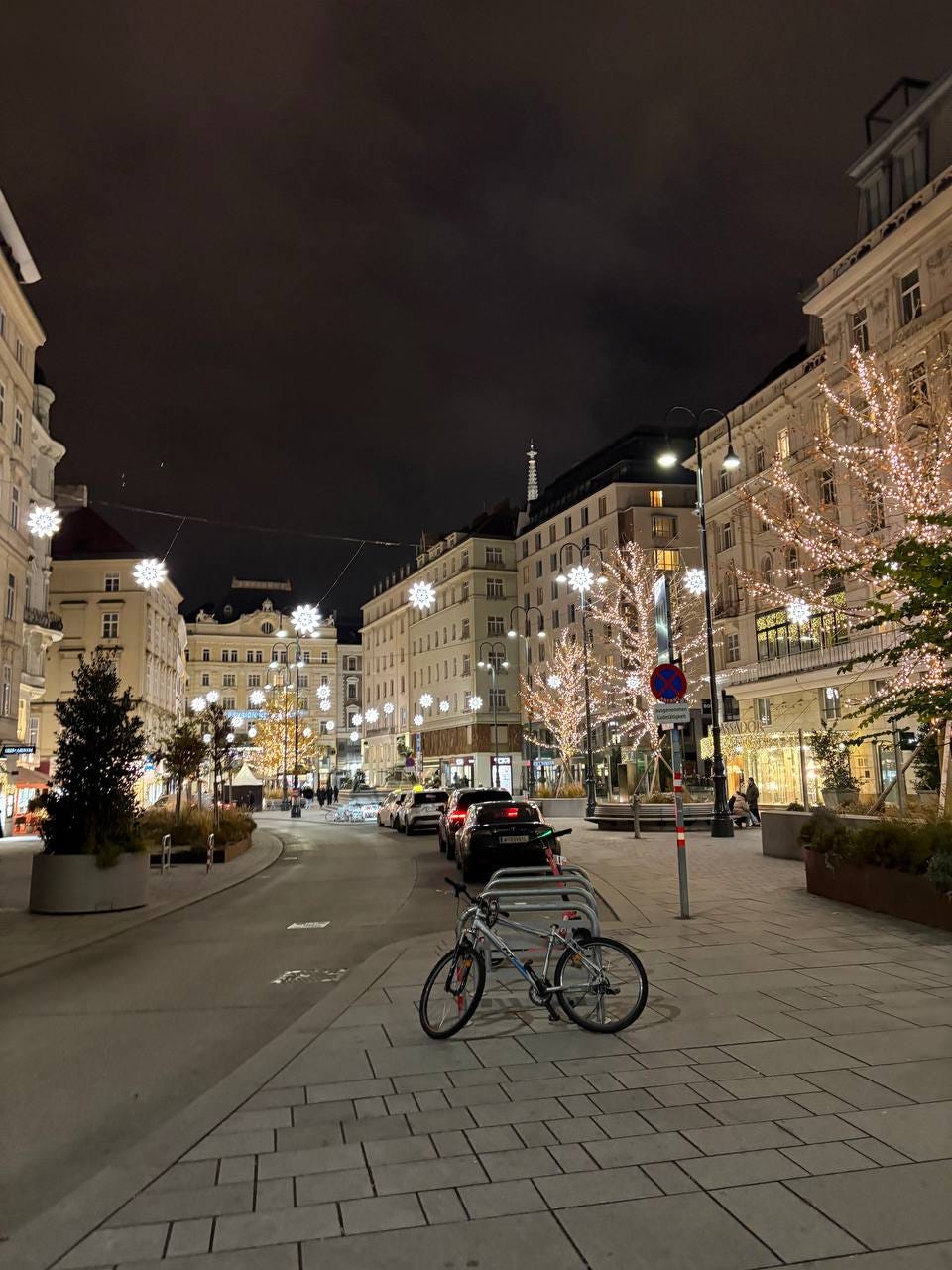
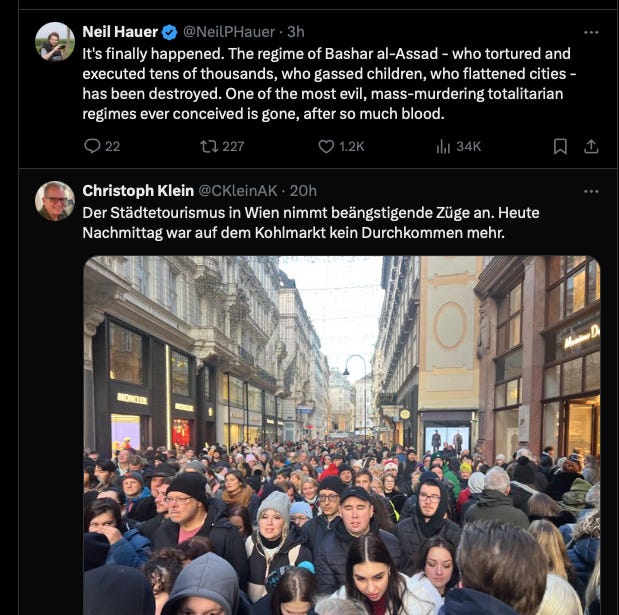
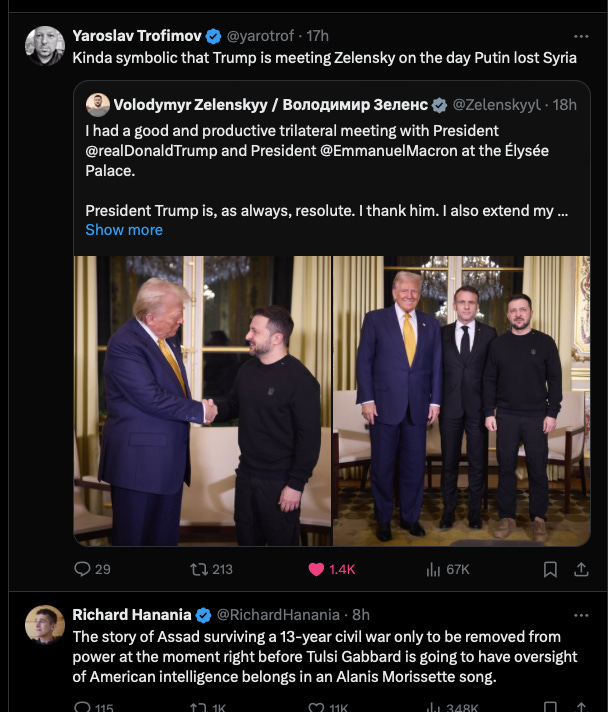
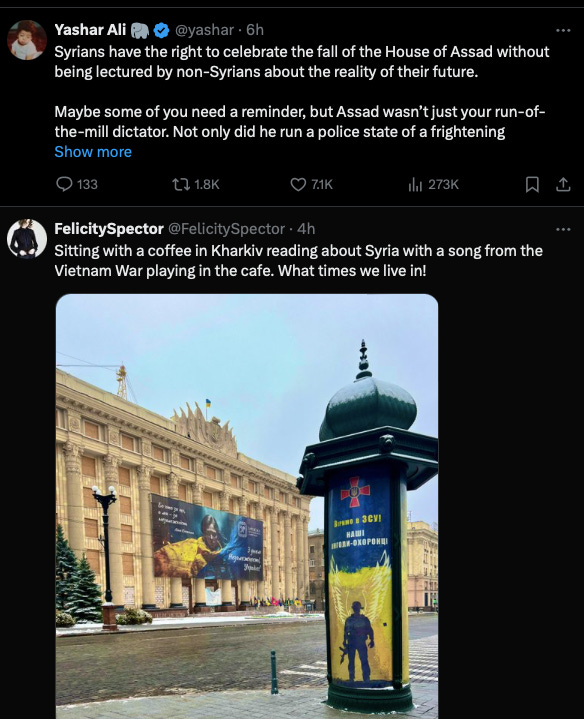
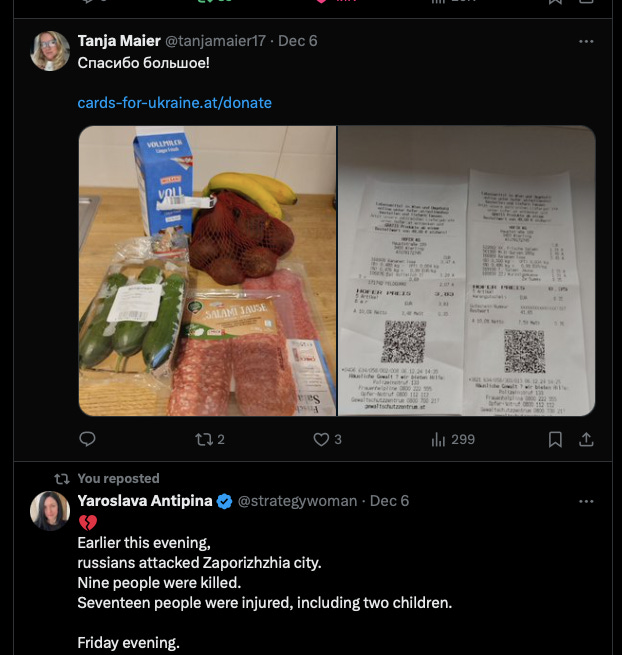











Russia is no longer huge, a fact that seems lost on most of us from older generations. In terms of population it is now about the size of Mexico. In terms of young men between 18-35 Russia is not much bigger than Iran. Russia cannot afford to fight a long protracted war, they just don’t have the young men, and without immigration there is no way to replace what they lose every day. Ukraine was also an aging shrinking country before the war of course , which is why Russia has been able to “win” a war of attrition so far. But Russia is now powerless next to China. And really would be no match for a united EU, which explains why Russian foreign policy is so focused on undermining the EU at every turn. Losing Syria is yet another blow to Putin’s dreams of re-establishing Russia as a great power. The danger of course is that he is more likely to lash out irrationally rather than retrench and rethink the disastrously failed Russian foreign policy of the last 15 years.